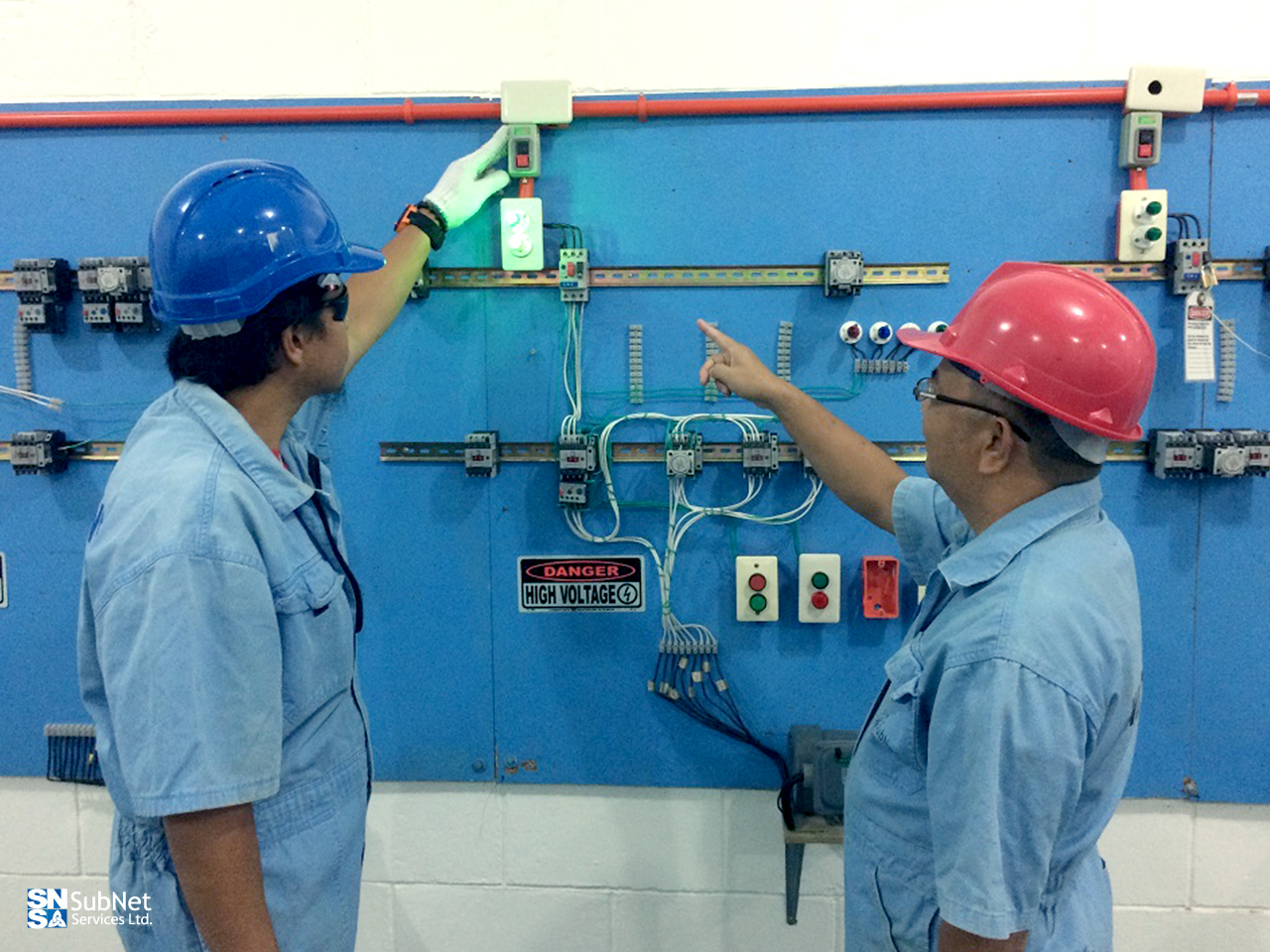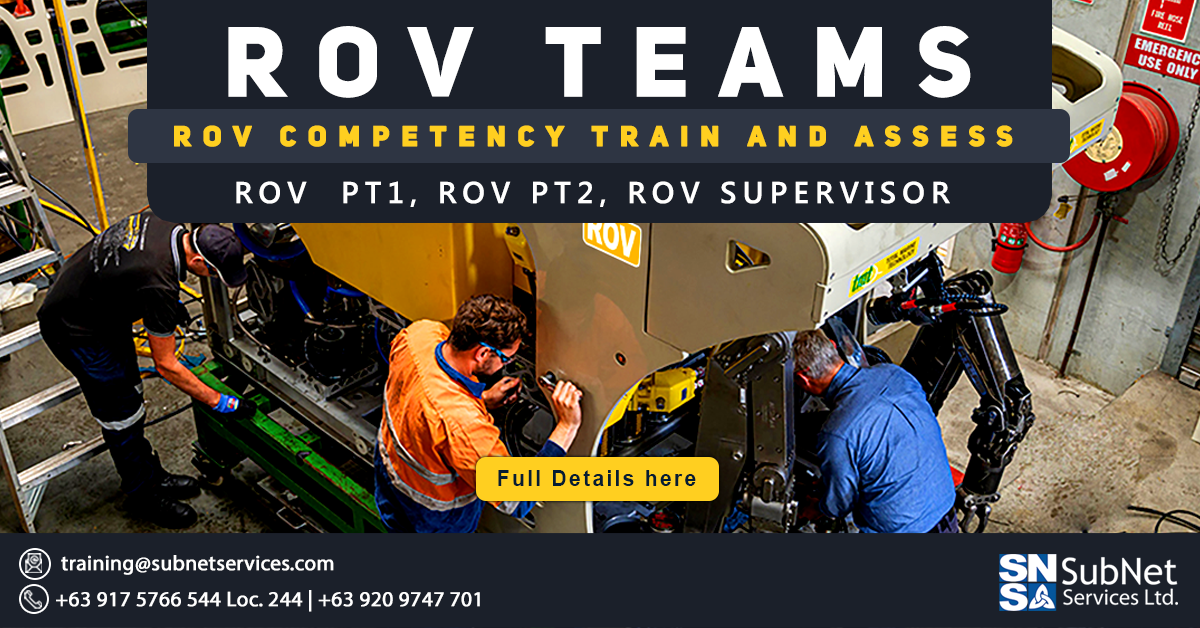ROV Electrical Safety Awareness
Written by Subnet Services ROV and Fiber Optics Instructor Floridel Cortez
Remotely Operated Vehicle (ROV) for underwater has been the partner in the offshore oil rig, underwater communication cable installations, and other major underwater constructions for safety installations and maintenance. ROV uses different sizes, from an observation class weighing less than 10kg to a work class ROV weighing one to a hundred tons in weight. Electrical power requirements of ROV increase from less than 1kw to a thousand kilowatts of power in relation to its class. The risks involved in electrical safety also increase without proper training in electrical safety awareness.
ROV Electrical Safety Awareness Training
ROV Electrical Safety Awareness is an International Marine Contractors Association’s (IMCA) mandated requirement for the ROV Pilot Technician (RPT). The RPT must have basic knowledge in the electrical theory, electrical equipment, electrical instruments, and safety awareness in relation to the use of electrical devices and equipment in a hazardous place or area. We also have to understand the risks on using high voltage systems for personnel protection, collaborated worker like the diver who may work together with the RPT. Without this basic electrical knowledge it might compromise the safety of the personnel, vessel, or onshore installations.
Electrical for RPT introduces personnel to the basic concepts of the safe operation of high voltage electrical power systems, which are embedded in ROV systems. On the successful completion of the course, delegates are expected to be able to work safely in the ROV electrical environment.
Electrical basic theory provides basic knowledge on the aspects of electrical production, which can help sink in knowledge on the application of electricity. Knowledge on the use of electrical test equipment such as voltmeter, ammeter, ohmmeter, insulation meter, and other electrical equipment provides experience, which ROV personnel can immediately apply even in the home electrical systems.
ROV Electrical Safety Hazards
There are a lot of electrical accidents that might happen due to lack of safety awareness. The most common we experience is a sudden tingling sensation when we touch something. This is called the static electricity build-up in our body. It looks normal until we work on the ROV electronic systems and handle electronic boards without precautions. Such static build-up can easily destroy system board or render it, running wounded and reducing the effective function of the board. One safety awareness is the use of ground strap attached to your body into the earth ground when handling electronic board.
The use of Personnel Protective Equipment (PPE) is a mandatory requirement when you want to check, test, or troubleshoot building electrical systems that involve higher voltages in excess of 1kV. Electrical accident is a violation of safety procedures. One example is simple protective gloves to isolate the person’s hands in checking electrical voltage.
Likewise, awareness on the use of electricity in hazardous environment will help in identifying hazards that can minimize the risks of explosion and/or fire by enhancing the safe use of electrical devices such as switch and circuit breaker.
ROV Electrical Safety Tips
Some of the basic ROV electrical safety tips that must be observed are the following:
- Have sufficient knowledge and awareness on the electrical supplies of the ROV. The tether usually operates in high voltage power supplies, which every technician must be aware before touching or holding the tether when it is operating.
- Be knowledgeable in the procedure of powering up and down to ensure ROV will not be damaged during operations.
- Have sufficient knowledge on the permit to work procedures to ensure safety maintenance work. Proving the power supplies dead and lock and tag must be applied properly.
ROV Electrical Safety Expert Opinion
As an instructor, I had an experience when one of the students failed to adhere to safety precautions of checking his work first before applying power. The incident resulted to a series of circuit breaker tripping. I instructed him to use the instrument in checking for any circuit abnormality like a simple resistance check for any shorted wiring before applying power.
I chose to write about this topic because ROV electrical safety is my expertise. I want to share my years of experience in electrical systems maintenance and troubleshooting because it is very much relevant to the courses taken by ROV students. Being a technical specialist on electronic/electrical systems, it is easy for me to effectively share the principles that will benefit my students. I have taken a lot of projects involving electrical/electronic even in my former companies; hence, I can say that this is akin to my life.
In conclusion, ROV is a state of the art machine with a high price. Personnel who will handle ROV must have a thorough knowledge in its system, operations, and safety electrical awareness, because safety is a collar to an accident free operation.



